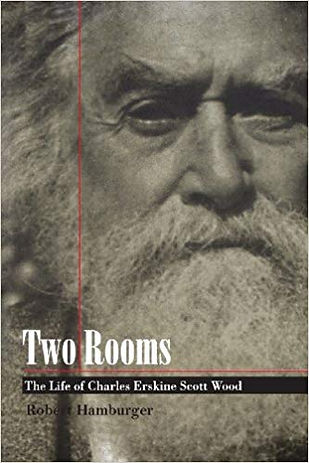Two Rooms: The Life of Charles Erskine Scott Wood
(U. of Nebraska Press: Lincoln & London, 1998)
With my trilogy behind me, I wanted to take another tack. My wish to write about America’s 'unfinished business' was as strong as ever, but I did not want to undertake yet another book in which I’d be a middle-class white man writing about the problems of hard-pressed African Americans. After All the Lonely People, I was wary of creating a niche in which grants and honors would come my way for writing about the problems of others. Also, after the grueling experience of immersing myself in the brutal world of Single Room Occupancy hotels, I needed a change.
I turned to biography—the life of Charles Erskine Scott Wood (1852-1944)—because, like me, he enjoyed a life of relative privilege, yet his heart was with the forces of social change. Wood’s life, so big and colorful, spanned nearly a century of American social history. Wood seemed to have his hand in everything: from a childhood glimpse of president-elect Lincoln, to taking part in the last of the Indian campaigns in the 1870s, to becoming a civic leader in Portland, Oregon; to campaigning for woman’s suffrage, to mingling with Max Eastman, John Reed and Louise Bryant in bohemian New York; to defending Emma Goldman and Margaret Sanger’s right to speak in public forums. And what an extraordinary array of notable figures he befriended! Chief Joseph of the Nez Perce Indians, Clarence Darrow, Lincoln Steffens, Emma Goldman, Teddy Roosevelt, James J. Hill, Childe Hassam, Ansel Adams, John Cowper Powys, Yehudi Menuhin, and Langston Hughes-- his life intersected with all of them and many more.
As a writer and lawyer Wood challenged the crackdown on ‘Reds' after WWI. And it was during those years that he wrote a series of short satirical pieces that make up Heavenly Discourses, an unlikely bestseller in which the evangelical leaders of Wood’s time, along with conservative defenders of public morality, arrive in heaven and discover that God is a free-thinker, that Jesus is unashamed of sex, and that agnostics like Mark Twain, Rabelais, Voltaire, Mary Wollstonecraft, and Margaret Fuller are eagerly awaiting their arrival in order to discuss the human condition with them. Wood was a 'fellow traveler' in the 1920s and 1930s, yet he spoke out in vehement opposition to the Stalinist purges. And in his old age, in failing health, he challenged the internment of Japanese-Americans during WWII. An amazing, restless life, boldly lived!
Writing Wood’s life consumed several years of rigorous research and writing. I found both Wood and my crash course in American history absorbing—and I loved the challenge of shaping a narrative that encompassed the extraordinary range of Wood’s exploits. After Two Rooms was published, the Oregon Cultural Heritage Commission sponsored a two-week celebration of Wood’s contributions to Portland’s cultural life, an event I was happy to take part in. The Western Writers Association of America selected Two Rooms as a finalist for their Best Western Nonfiction award.

To purchase Two Rooms, click this link